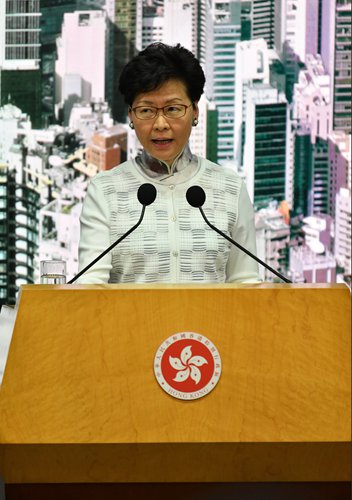HOME >> OPINION
US using Hong Kong unrest as bargaining chip
Source:Global Times Published: 2019/6/17 22:11:00

Photo: IC
Heightened interference by external forces including the US and Europe in fomenting unrest in Hong Kong has encouraged protesters to create more trouble in the city.These forces claimed that if the amendment to the extradition bill is passed, rights and legal protection to their personnel and institutions based in Hong Kong will be weakened.
At the same time, the US and Europe took advantage of the concern among Hongkongers to play the Hong Kong card, aiming to pressure China. Washington apparently wants to use Hong Kong to strong-arm Beijing.
The Hong Kong Special Administrative Region (HKSAR) tried to restore calm by announcing on Saturday that it will suspend the process of amending the bill. The HKSAR government wants to prevent turmoil, injuries and defend fundamental national interests.
The suspension was a compromise, but the opposition wouldn't necessarily buy it. A protest on Sunday demanded the bill be scrapped. Such being the case, whether the suspension will lead to the protests folding up depends on how the opposition and external forces behind it treat Hong Kong.
The revised extradition bill will have no real impact on Hongkongers who abide by laws. The reason society in Hong Kong reacted so strongly was that the opposition used it to create fear among citizens.
Many Hongkongers don't understand that the amendment helps improve the rule of law in Hong Kong. Because of their distrust of judiciary and rule of law on the mainland and their scarce knowledge, they were full of fear of someday being handed over to the mainland and sentenced there. Young people, in particular, accepted opposition propaganda without going into details of the proposal.
The episode showed that Hong Kong lacks quality national education. Many people's knowledge of the national system and rule of law on the mainland is still superficial. This is what both central and HKSAR governments should take seriously because it is related to Hongkongers' national identity. Otherwise, any legislation and decision in the future that involves national integration may meet the same fate.
The central government has adopted many policies, such as developing the Guangdong-Hong Kong-Macao Greater Bay Area, to help solve livelihood problems in Hong Kong and promote the development of the city and the mainland. But not many Hongkongers hail the policies.
Due to Hong Kong's colonial history of more than 150 years and a sense of superiority complex, most Hongkongers don't have the urge and opportunity to visit the mainland and thus don't really know about it. This means that even though the central government has a set of proactive policies, the actual effects accrue slowly.
Authorities' previous work has overlooked that Hong Kong itself needs to make some changes. Current measures to integrate Hong Kong with the mainland's development could have certain limitations.
Hence, some changes are needed. Authorities should consider how to let Hongkongers be part of integrated development and what changes Hong Kong itself should make. If the city's education system and sociocultural atmosphere don't change, policies from the outside will have limited effect.
Many liberals in Hong Kong admire US-style liberalism. However, many of them were disillusioned after US President Donald Trump took office, and then became lost. The violence during protests is an outcome of such confusion. The Hong Kong elites have values consistent with those of the West. When they were motivated and supported by the US, they would participate in the protests more enthusiastically.
Resorting to violence during demonstrations has actually jeopardized Hongkongers' own interest. Hong Kong's society inherently had zero-tolerance for violence, but now people have learnt to tolerate and indulge in it. This signals that social movements in Hong Kong are becoming increasingly radical and populist.
The street movements in Hong Kong have shown a tendency to damage the "One Country, Two systems" policy and hurt prosperity and stability. These movements abused liberalism; they conform neither to traditional British liberalism nor to the striving spirit of Hongkongers, but bring about deterioration of rule of law.
Not only the HKSAR government but also elites in Hong Kong should be vigilant and work jointly to restrain such a tendency. They must be aware that the rational nature of their society is changing.
The article was compiled by Global Times reporter Xu Hailin based on an interview with Tian Feilong, associate professor at the Law School of Beihang University and member of Beijing-based Chinese Association of Hong Kong and Macao Studies. xuhailin@globaltimes.com.cn
Posted in: VIEWPOINT